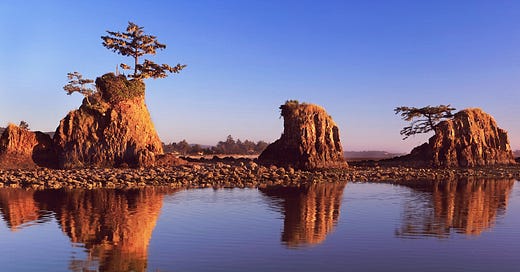How to Make Oregon a "Home" for All
As we continue to see more people move to Oregon in search of home, I hope we look at why they come with more compassion than stereotypes.
Home. A simple word, yet holds so many meanings. Home. For some it is a choice. For some it is an elusive goal. Home for many is where they rest, where they find connections, where they migrate to, where their ancestors are from, or a combination of any or all of these.
Home. For me, Oregon has been a home for much of my life. Originally from an inter-tribal community on Chumash lands in Southern California, I moved to the Oregon Coast half-way through middle school. We migrated towards my stepfathers’ homelands of the Siletz people.
My first home in Oregon was in a van with my parents, two younger brothers, our cat, and our dog. It was home. Parked in family’s driveways, parked under trees, parked where we felt safe. It was our little home and we made the most of what we had, which was not much in terms of material things.
Reflecting back, I know that my peers thought I was a little strange, although it was not clear exactly why. I’m not sure if it was because our little home was mobile, or if it was because I was able to thrive in spite of or because of my unique living situation, or if it was because I was a brown girl from Southern California in a predominately white town, Lincoln City. Whatever the reason, our home transitioned to a two bedroom, double wide which continued to provide us shelter, warmth, and stability until I left for college years later.
Home is meant to be welcoming. That’s not always the case though. It wasn’t all great moving to the Oregon Coast from Southern California. My dark skin and my brother’s, along with his long hair, caused us to stand out significantly. I always felt like an outsider, and people would sometimes remind me that I wasn’t from there.
Where did they think I was from though? It was always hard telling. “Where are you from?” followed by, “but like really from?” became common. After I decided I couldn’t take the continual othering and exclusion anymore, I pleaded with my parents to move back to California with my birth dad.
One year. That is what I was able to negotiate. One year of my other home, Santa Barbara, the place I was born. The homelands of my Chumash ancestors. Home with my dad and the warm ocean. One year. Then, I came back.
Back to Oregon and the comments and the continual reminders that I wasn’t from here. One of my most memorable comments was being told to “go back to México” by a peer—a comment that assumed both my dark skin and California roots equaled “not from here.” I remember sharing some confrontational words with a reminder that my ancestors have always been part of these lands. Later in life, I realized that the comment stemmed from a sense of xenophobia (the dislike of or prejudice against people from other countries) and the stereotype that Indigenous people were all gone. “Gone like the dinosaurs” is what one of my brother’s elementary school teachers told the class. How could a community in a city built on Siletz lands with the Siletz Tribes just a short way away hold these views?
Further into life, I learned the full extent of Oregon’s history of anti-Blackness, including having it written into the State Constitution as an attempt to keep Black people from moving to Oregon. A failed attempt even in the days it was written, but an attempt that stayed in the Constitution for generations. Coupled with the forced removals of Tribes and acts of genocide against Indigenous people, Oregon was never designed for someone like me. An outsider in all the ways the state was constructed. Yet, this is still my home.
I can’t help but think of the ways people often talk about Californians taking over Oregon and ruining the state. I can’t help but think of how California is often described as a brown state, and it makes me wonder if this mindset is built upon the idea during its early construction that Oregon should be a white state. That is how it was designed, yet that is never what it was. The diversity of people living in Oregon has existed for generations, and in the case of Indigenous people, since the beginning of time.
As we continue to see more people move to Oregon in search of home, I hope we look at why they come with more compassion than stereotypes. As an Indigenous person, I understand the migration and travel paths of my ancestors, and the ancestors of so many. Migration is part of the history of these lands that has existed longer than the idea of Oregon. I hope we look at the structural reasons behind our housing crisis and loss of income rather than place blame on those viewed as “outsiders.” Maybe then we can turn Oregon into a place that more people can truly and fully call “home.”
Luhui Whitebear (she/her) is Coastal Chumash. She is a mother, poet, and Indigenous activist. Luhui is passionate about disrupting systems of oppression and creating positive change in society.
"Older Brothers" by Ian Sane is licensed under CC BY 2.0




